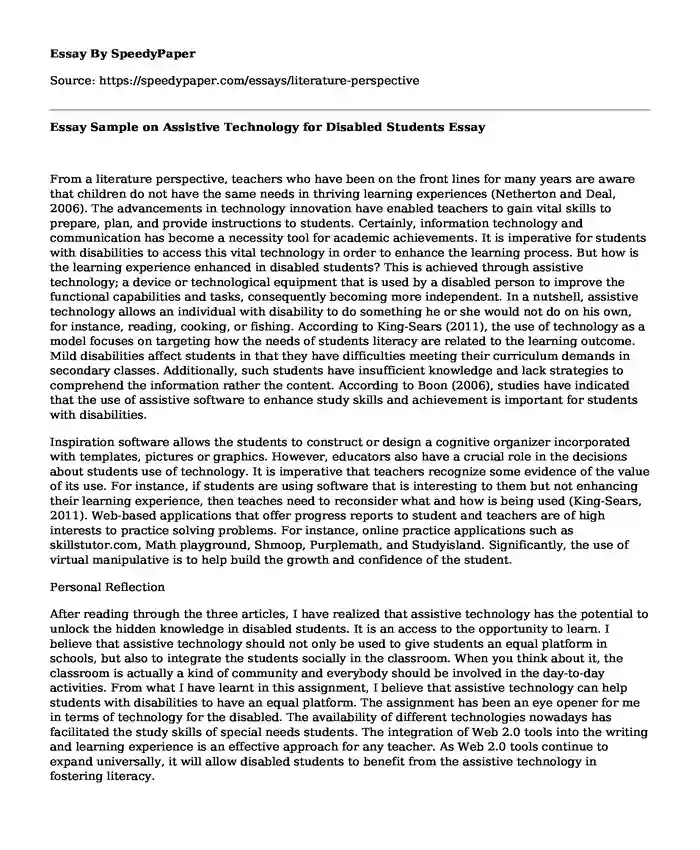
| Type of paper: | Essay |
| Categories: | Teaching Learning Education Technology |
| Pages: | 3 |
| Wordcount: | 681 words |
From a literature perspective, teachers who have been on the front lines for many years are aware that children do not have the same needs in thriving learning experiences (Netherton and Deal, 2006). The advancements in technology innovation have enabled teachers to gain vital skills to prepare, plan, and provide instructions to students. Certainly, information technology and communication has become a necessity tool for academic achievements. It is imperative for students with disabilities to access this vital technology in order to enhance the learning process. But how is the learning experience enhanced in disabled students? This is achieved through assistive technology; a device or technological equipment that is used by a disabled person to improve the functional capabilities and tasks, consequently becoming more independent. In a nutshell, assistive technology allows an individual with disability to do something he or she would not do on his own, for instance, reading, cooking, or fishing. According to King-Sears (2011), the use of technology as a model focuses on targeting how the needs of students literacy are related to the learning outcome. Mild disabilities affect students in that they have difficulties meeting their curriculum demands in secondary classes. Additionally, such students have insufficient knowledge and lack strategies to comprehend the information rather the content. According to Boon (2006), studies have indicated that the use of assistive software to enhance study skills and achievement is important for students with disabilities.
Inspiration software allows the students to construct or design a cognitive organizer incorporated with templates, pictures or graphics. However, educators also have a crucial role in the decisions about students use of technology. It is imperative that teachers recognize some evidence of the value of its use. For instance, if students are using software that is interesting to them but not enhancing their learning experience, then teaches need to reconsider what and how is being used (King-Sears, 2011). Web-based applications that offer progress reports to student and teachers are of high interests to practice solving problems. For instance, online practice applications such as skillstutor.com, Math playground, Shmoop, Purplemath, and Studyisland. Significantly, the use of virtual manipulative is to help build the growth and confidence of the student.
Personal Reflection
After reading through the three articles, I have realized that assistive technology has the potential to unlock the hidden knowledge in disabled students. It is an access to the opportunity to learn. I believe that assistive technology should not only be used to give students an equal platform in schools, but also to integrate the students socially in the classroom. When you think about it, the classroom is actually a kind of community and everybody should be involved in the day-to-day activities. From what I have learnt in this assignment, I believe that assistive technology can help students with disabilities to have an equal platform. The assignment has been an eye opener for me in terms of technology for the disabled. The availability of different technologies nowadays has facilitated the study skills of special needs students. The integration of Web 2.0 tools into the writing and learning experience is an effective approach for any teacher. As Web 2.0 tools continue to expand universally, it will allow disabled students to benefit from the assistive technology in fostering literacy.
In future, I plan to help struggling students by providing them with simple, assistive technology devices such as the reading pen or talking dictionary. Helping disabled students with their struggles has become important to me, therefore, with this great deal of information from my assignment, I plan to advocate for the implementation of assistive technologies and Web 2.0 tools in all learning resource centers.
References
Boon, R. (2006). The Impact of Cognitive Organizers andTechnology-Based Practices on Student Success in Secondary Social Studies Classrooms. Journal of Special Education Technology, 21(1). Retrieved from http://www.academia.edu/2798499/Assistive_technology_and_literacy_learning_Reflections_of_parents_and_children
King-Sears, M. (2011). TECHnology and Literacy for Adolescents with Disabilities. Journal of Adolescent & Adult Literacy, 54(8), 569-578. doi:10.1598/jaal.54.8.2
Netherto, D., & Deal, W. (2006). Assistive Technology in the Classroom. Academic Journal Article: The Technology Teacher. Retrieved from https://www.questia.com/library/journal/1G1-151712983/assistive-technology-in-the-classroom
Cite this page
Essay Sample on Assistive Technology for Disabled Students. (2019, May 23). Retrieved from https://speedypaper.net/essays/literature-perspective
Request Removal
If you are the original author of this essay and no longer wish to have it published on the SpeedyPaper website, please click below to request its removal:
- Essay Example on Pipeline Infrastructure Monitoring
- Grad School Application Essay, Free Example for You
- Gross Income: Exclusions, Free Essay on Taxation
- Management Essay Sample on the Strategies for UNHCR
- Blended Family Complications in the Latter Years - Free Paper with a Literature Review
- Essay Sample on Using Sociological Theory to Understand Organizational Change
- Essay Example about Saudi Arabia Risks and Opportunities Relative to Key Export
Popular categories




